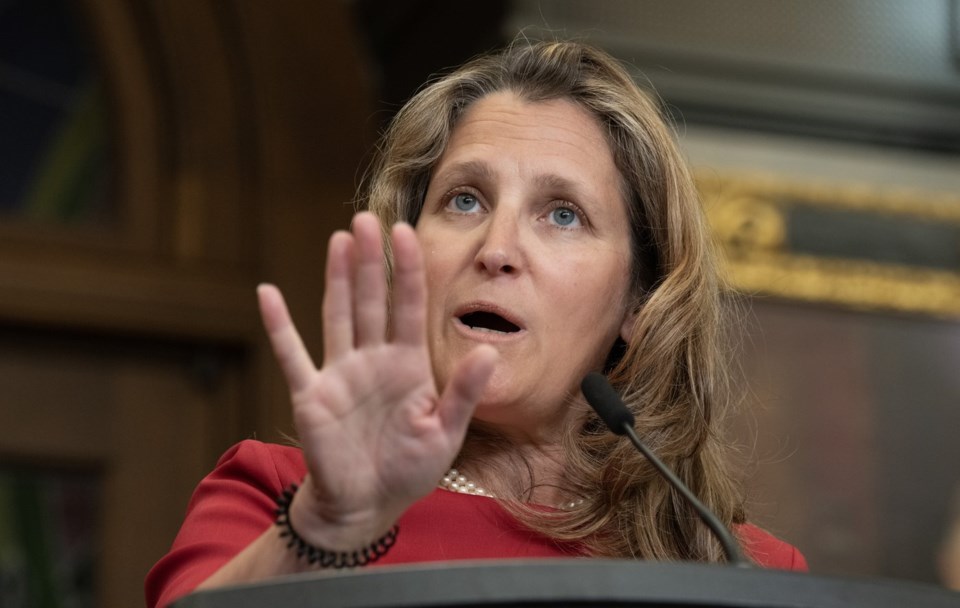OTTAWA — Canada accused China of undermining global trade rules and flooding the market with electric vehicles Monday as Finance Minister Chrystia Freeland kick-started the process required to impose new import taxes on Chinese-made EVs.
The move comes weeks after both the United States and European Commission moved to impose their own new import tariffs on Chinese EVs, citing unfair subsidies aimed at displacing more expensive vehicles made in Europe and North America.
Speaking at an auto parts manufacturing plant in Vaughan, Ont., Freeland said a 30-day consultation will begin July 2 to investigate China's unfair market practices related to EVs.
But it seems clear that Freeland believes she already has the evidence she needs.
"China has been intentionally creating overcapacity and oversupply and exporting that to other countries," she said. "That is actually not playing by the global trade rules and Canada will not stand for that."
Canada has made massive investments in its auto sector in the last four years in a bid to solidify Canada's position as a global leader in the EV supply chain.
Since October 2020, companies have promised investments of $46 billion in 13 different EV plants, battery factories and battery precursor production sites. Canada and the provinces are offering up to $53 billion to those projects, including through tax credits, production subsidies and capital investments.
Canada is also working closely with the United States to try to counter China's dominance in EVs and other clean technologies.
The efforts have resulted in Canada taking top spot, ahead of China, for the first time this year on Bloomberg NEF's annual ranking of the potential of countries in the lithium-ion battery supply chain.
Canada's tariff investigation is being launched under section 53 of the Customs Tariff Act, which allows for imposition of a surtax on imported goods in response to practices that adversely affect Canada's industry.
It is the same section used in 2018 when Canada imposed a retaliatory surtax on imported aluminum and steel goods from the United States after then-president Donald Trump levied new import tariffs on Canadian aluminum and steel.
Freeland said she is "not ruling anything out" of a potential response, including expanding a surtax beyond just electric vehicles to other components of the EV supply chain, such as batteries and their precursor materials.
The consultation will consider not only economic harm to Canada, but also national security risks, and environmental, labour and human rights standards.
"I think there is a prima facie case to say China falls short in those areas," she said.
Aside from a surtax on imports, the consultation will weigh additional investment restrictions and whether Canada should make changes to which vehicles are eligible for the federal EV rebate.
The rebate is currently worth up to $5,000 for EVs up to a certain price point.
Right now the only Chinese-made EVs imported into Canada are from the U.S. tech giant Tesla, made at the company's Shanghai factory. There are no Chinese-branded EVs sold or imported here at the moment.
The Teslas are subject to a six per cent import tariff, currently the rate that would be applied to any Chinese-made vehicles, but most models qualify for the $5,000 rebate.
Canada's automakers and auto unions have expressed concern about the potential for an influx of cheap Chinese cars, as that country has become the dominant player in the EV industry worldwide.
Unifor president Lana Payne welcomed the Canadian move alongside Freeland Monday.
"A surge of low-cost EV imports from China will undermine everything being done right now to rebuild and grow a strong and truly national auto industry," said Payne.
David Adams, president of Global Automakers of Canada, said in a statement Monday he also backed the move. "It’s important that the government of Canada provides a level playing field for the sector and we look forward to participating in the consultation process."
Conservative trade critic Kyle Seeback said in a statement that protecting the jobs of Canadian workers is his party's priority. "Canada should not allow the dumping of cheap Chinese products into our country that threaten Canadian manufacturing jobs."
Seeback also raised concerns about Canada's subsidies for EV battery plants allowing foreign workers to displace Canadians.
About 70 per cent of EV batteries and 60 per cent of EVs are now made in China.
The European Commission launched an anti-subsidy investigation of Chinese EVs last fall after Chinese market share in Europe grew from less than one per cent to more than eight per cent in under four years.
Europe announced about two weeks ago it intends to impose a surtax of between 17 and 38 per cent on Chinese imports, on top of the existing 10 per cent import tariff, starting July 4. However over the weekend Europe and China agreed to negotiations, which could change or delay that move.
China has threatened to retaliate against European goods if the surtax goes ahead as planned.
U.S. President Joe Biden said in mid-May the import tax on Chinese EVs would quadruple to 100 per cent, with the import tax on EV batteries going to 25 per cent from 7.5 per cent. Both increases are set for August.
This report by The Canadian Press was first published June 24, 2024.
— With files from Maan Alhmidi in Vaughan, Ont.
Mia Rabson, The Canadian Press




